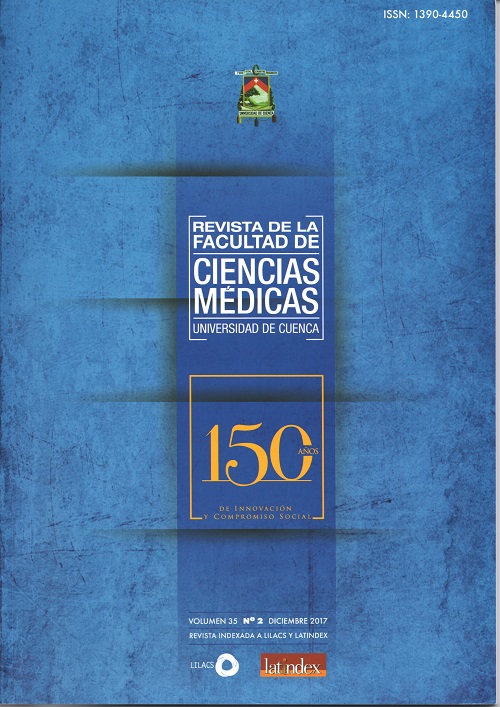Estudio cualitativo sobre el Malestar: Perspectivas de la medicina tradicional en Cuenca, El Tambo y Saraguro - Ecuador
Abstract
RESUMEN
Antecedentes y objetivo: la cosmovisión andina mira la realidad de acuerdo a sus paradigmas, leyes y principios basados en la observación de la naturaleza y un razonamiento analógico; el malestar o la enfermedad, ha sido entendido como el desequilibrio de la armonía del ser consigo mismo, con la familia, con la naturaleza y con el cosmos. Por lo tanto, el presente estudio pretende entender los significados y sentidos del malestar Kichwa de los sabios de la medicina ancestral.
Metodología: se llevó a cabo un estudio cualitativo, fenomenológico postpositivista del malestar
desde la perspectiva de la medicina tradicional con hombres y mujeres de sabiduría andina de la ciudad de Cuenca, El Tambo y Saraguro. Se utilizó muestreo bola de nieve y por conveniencia. Las entrevistas fueron grabadas y transcritas literalmente. Los datos se analizaron con el programa Atlas ti utilizando análisis de contenido.
Resultados: para la medicina ancestral la
enfermedad y salud son conceptos singulares en cuanto que se refieren a un estado del ser humano y no únicamente al estado de órganos o partes aisladas del cuerpo. Un elemento capital del malestar es el dolor/sufrimiento. El malestar es compartido, los sufrimientos son comunitarios y la sanación de alguien es también la sanación de los otros. El malestar nace en la convivencia que es siempre comunitaria, el malestar de los otros es también el malestar de cada quién. Conclusiones: el malestar en las comunidades Kichwas de Cuenca, El Tambo y Saraguro se produce por la desconexión o el desequilibrio con uno mismo, con los demás, con la naturaleza y con lo sobrenatural. El malestar se puede sanar con la intermediación de los Yachaks o sanadores por medio de diferentes métodos o elementos, lo que constituye una medicina diferente a la medicina convencional cuyo enfoque es del tipo bioquímico - molecular.
Palabras clave: Salud y enfermedad, medicina tradicional, factores
culturales, Distribución Espacial de la Población.
ABSTRACT
Antecedents and objective: The Andean cosmo-vision looks at the reality according to its paradigms, laws and principles based on the observation of nature and an analogical reasoning; the discomfort or disease has been understood as the imbalance of the harmony of being with oneself,
with the family, with nature and with the cosmos. Therefore, the present study aims to understand the meanings and senses of the Kichwa malaise of the sages of ancestral medicine.
Methodology: a qualitative, post-positivist phenomenological study of the discomfort was carried out from the perspective of traditional medicine with men and women of Andean wisdom from the city of Cuenca, El Tambo and Saraguro. A snowball sampling was used and for convenience. The interviews were recorded and transcribed literally. The data was analyzed with the Atlas program using content analysis
Results: ancestral medicine for disease and health are unique concepts in which refer to a state of the human being and not only to the state of organs or isolated parts of the body. Important elements of discomfort are pain and suffering. Discomfort is shared, sufferings are communal and the healing of someone is also the healing of others. The discomfort born in the coexistence that is always communal, the discomfort of others is also the discomfort of each one.
Conclusions: The discomfort in the Kichwa communities of Cuenca, El Tambo and Saraguro is caused by the disconnection or imbalance with oneself, with others, with nature and with the supernatural. The discomfort can be healed with the intermediation of the Yachaks or healers through different methods or elements, which constitutes a medicine different from conventional one whose approach is of the biochemical- molecular type.
Key words: Disease, medicine traditional, Cultural Factors, Residence Characteristics.
Downloads
Downloads
Published
Issue
Section
License
Copyright (c) 2018 Aydée Angulo Rosero, Liliana Brito Roby, David Achig Balarezo, Carlos Arévalo Peláez, Rosendo Rojas Reyes, Carmita Quizhpi Merchán, Lorena Mosquera Vallejo, Marcelo Quishpe Bolaños

This work is licensed under a Creative Commons Attribution-NonCommercial-ShareAlike 4.0 International License.
Copyright © Autors.

You are free to:
 |
Share — copy and redistribute the material in any medium or format |
 |
Adapt — remix, transform, and build upon the material for any purpose, even commercially. |
Under the following conditions:
 |
Attribution — You must give appropriate credit, provide a link to the licence, and indicate if changes were made. You may do so in any reasonable manner, but not in any way that suggests the licenser endorses you or your use. |
| NonCommercial — You may not use the material for commercial purposes. | |
| ShareAlike — If you remix, transform, or build upon the material, you must distribute your contributions under the same license as the original. |
| No additional restrictions — You may not apply legal terms or technological measures that legally restrict others from doing anything the licence permits. |






